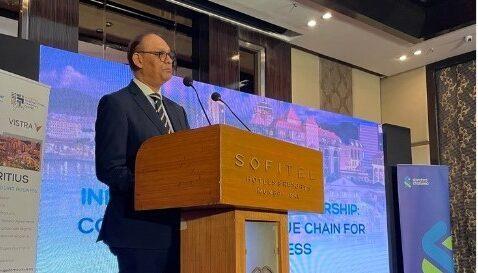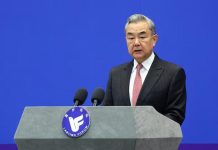Africa-Press – Mauritius. The Mauritius International Financial Centre, which seeks to promote foreign investment and cooperation opportunities in the country, does not deny African nations of much-needed tax revenue as critics allege, says the Minister of Financial Services and Good Governance.
In a lengthy interview with The Africa Report, Mahen Seeruttun argues that his country Mauritius has been instrumental in supporting Africa on different levels.
Can you give us some figures on the fundamentals of the Mauritius IFC as an ideal conduit for investment?
The financial and insurance activities industry is expected to contribute around 13.2% of Mauritius’ GDP in 2022, with a growth rate of 3.7%. This shows its buoyancy in the new normal. In 2022, there were 1,546 new firms licensed, including 947 global business companies.
Being a tried and tested international financial centre for the past three decades, Mauritius continues to pave its way with the provision of innovative and highly competitive products and services.
The jurisdiction has established itself as a mature IFC with a strong regulatory framework, which contributed towards the setting up of several structures.
Further[more], the country provides a politically and economically stable environment while also being geographically and culturally close to the countries in Africa and Asia, making it a preferred platform for establishing structures and making it the ideal conduit for investment.
A report [titled] ‘Facilitating Growth, Employment & Prosperity in Africa’ from Capital Economics, which has been commissioned by the Economic Development Board in 2021, stated that Mauritius is an important and growing partner for investment.
The overall stock of foreign investment mediated through Mauritius amounts to $560bn. As per latest statistics, the value of Direct Investment Outwards as of December 2021 amounted to $295bn. The financial services sector has emerged as a significant pillar of the Mauritian economy, servicing clients across the globe.
In this context, the Mauritius International Financial Centre has become known as an innovative reputable and diversified hub for cross border structuring, wealth management, and funds, with almost 1,000 global funds now domiciled in the jurisdiction.
There are currently around 12,500 active global business companies. As an internationally recognised jurisdiction of repute, the Mauritius International Financial Centre – MIFC – is home to a number of international banks, legal firms, corporate services, investment funds and private equity funds. How has the Mauritius IFC enhanced its regulatory frameworks to prevent illicit financing and money laundering?
At the very outset, we have put in place a robust AML/CFT Coordination Mechanism starting with the Inter-Ministerial Committee, which sets the tone in terms of our commitment in fighting IFFs; a Core Group was set up to, amongst others, ensure the effective implementation, by the relevant competent authorities, of the recommendations of Financial Action Task Force and a National Committee for coordination and the implementation of national policies and activities pertaining to AML/CFT/CPF.
We also embarked on an extremely ambitious exercise to overhaul the AML/CFT legal framework, which, under the patronage of the Honourable Prime Minister, resulted in the adoption of new laws and regulations, a comprehensive National AML/CFT Strategy and a National Action Plan.
To this end, around 50 pieces of legislation were amended last year. We proclaimed an innovative piece of legislation to regulate the business activities of Virtual Assets Service Providers (VASPs) and insurers of initial token offerings.
We also focused our efforts on the development of human capabilities within the AML/CFT agencies in order to enable them in carrying out their functions efficiently.
The government has also put additional strong and sustainable measures, which include robust supervision of the global business, non-bank financial services sector, non-profit organisations, and regulation of beneficial ownership information.
These ongoing reforms, together with the strong political will and collaboration of the private sector to adhere to effectively implement the global standards and best practices to prevent illicit financing and money laundering, culminated in the delisting of Mauritius from the FATF Grey List as well as ticking out all the FATF 40 recommendations.
What does Africa represent for Mauritius IFC? Mauritius is emerging as an ideal platform for African investments and acts as a natural gateway between Asia and Africa.
Africa and Mauritius have traditionally enjoyed close cultural, business and bilateral ties. Mauritius is signatory to all the major African conventions.
With its extensive network of Double Taxation Avoidance Agreements and Investment Promotion and Protection Agreements as well as with its memberships with regional trading blocs like the Southern African Development Community (SADC) and the Common Market for Eastern & Southern Africa (COMESA), and IOR-ARC, Mauritius is very much present on the continent.
Mauritius offers investors a conducive environment for doing business, which guarantees predictability, certainty and security. Mauritius offers a diligent, educated, multilingual and experienced professional labour force.
All these have contributed to the country being ranked 13th globally and 1st in Africa in the 2021 ‘World Bank [. . . ] Doing Business Report’. Our country is today recognised as the gateway for emerging countries, offering high value added services and protection to its investors.
The reputation of Mauritius as a well-regulated and business friendly investment destination is also evidenced by its international recognition with the IOSCO, IAIS, OECD, FATF and IFSB.
Moreover, Mauritius provides a number of fiscal and non-fiscal advantages to its investors. The country is a worldwide reference for political and economic stability. Its constitution is modelled on the British Parliamentary system with the highest court of appeal being the Privy Council of the United Kingdom.
As FDI into Africa continues to rise, led by countries, such as China, Hong Kong, India, Malaysia and Singapore, investors looking at Africa are more and more structuring their investments through Mauritius.
What do you say to those criticising Mauritius for impoverishing African governments and widening wealth inequality? I would tend to differ with these two statements.
Mauritius has instead contributed widely towards enriching African governments and narrowing wealth inequality. Foreign investment mediated by Mauritius supports 4.2 million new jobs in mainland Africa, representing 0.6% of all employment in the continent.
Mainland Africa is the largest destination for investment from Mauritius outside of Asia, totalling $82bn. [This] investment mediated by Mauritius supports around $6bn per annum in tax revenues for African governments.
The Mauritius IFC is critical to facilitate the levels of foreign investment needed to stimulate growth and development on the continent. By working with African partners, Mauritius can also play a role in helping Africa achieve its Sustainable Development Goals over the next decade.
Mauritius is already making a significant contribution. The investment from Mauritius into mainland Africa is equivalent to 9% of all reported foreign direct investment and portfolio investment on the continent.
It is important to consider the figures, which indicate that instead of widening the inequality, Mauritius has been instrumental in bridging the gap and will continue to support Africa.
Investment activity in Mauritius supports jobs, gross domestic product, and tax receipts in Africa. Mauritius stimulates economic activity and tax revenues through increased FDI. Up to 47% of investment into Africa (excluding South Africa) has been facilitated under a DTA.
There is a trade-off for African countries between foregoing some direct corporate tax revenue and encouraging foreign investment, which in turn stimulates economic activity and tax revenues. Assessing the impact of DTAs on FDI is not easy but there is evidence to suggest a positive relationship.
At least 53% of investment from Mauritius into Africa (excluding South Africa) is not covered by a DTA, which means there is little or no scope for domestic taxes to be avoided by booking incomes or profits in Mauritius. The responsibility is on source countries to ensure appropriate tax is paid on activity there.
For More News And Analysis About Mauritius Follow Africa-Press







